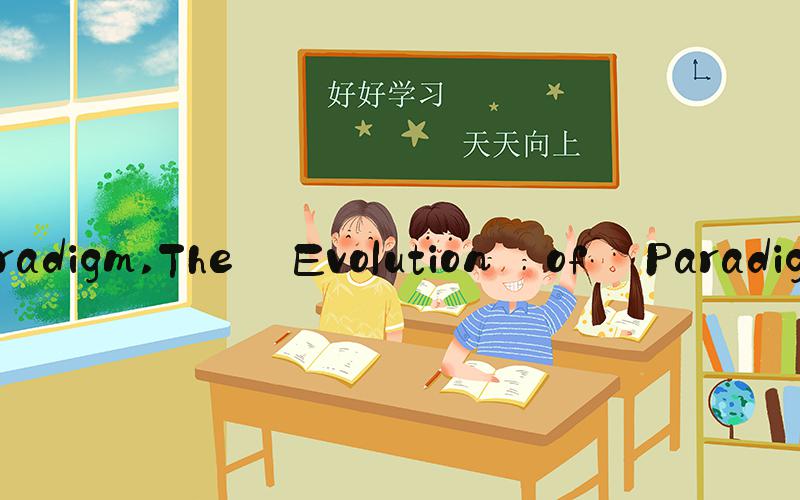AI答案
 Paradigm: The Shift in Perception
Paradigm: The Shift in PerceptionParadigm is a term commonly used in the field of philosophy, science, and social sciences, which refers to a set of ideas, concepts, and assumptions that form a framework for understanding a particular subject matter. It is a lens through which we view the world and interpret it. Paradigms are not immutable, and they can shift, evolve, and transform over time. The shift in paradigm often leads to a change in perception, which can be both positive and negative, depending on how it affects us.
The Evolution of ParadigmsParadigms are not fixed, and they evolve and change over time. The evolution of paradigms often happens in response to new discoveries, breakthroughs in technology, and changes in societal norms. For instance, the Industrial Revolution in the eighteenth and nineteenth centuries brought about a shift in the paradigm from an agricultural and rural society to an industrial and urban society. The discovery of the theory of relativity by Albert Einstein in the early twentieth century was a paradigm shift in the field of physics.
The Importance of ParadigmsParadigms are essential because they shape our understanding of the world and our place in it. They influence the way we think, the way we perceive things, and our actions. Paradigms are like maps that guide us on our journey, and without them, we would be lost. The shift in paradigms can provide new opportunities and perspectives, but it can also create confusion and uncertainty. Understanding the importance of paradigms can help us to navigate these changes, and embrace them with an open mind.
The Negative Consequences of Paradigm ShiftsThe shift in paradigms can have negative consequences as well. It can challenge our beliefs, undermine our values, and disrupt our sense of identity. The shift in the paradigm of family structures, for instance, can create a sense of uncertainty and confusion, especially for those who hold strong traditional values. The shift in the paradigm of work can also lead to job loss, unemployment, and economic instability. Paradigm shifts can create a sense of chaos, and it can take time for society to adapt and adjust to these changes.
The Positive Outcomes of Paradigm ShiftsDespite the negative consequences, paradigm shifts can also bring about positive outcomes. The shift in the paradigm of agriculture, for instance, led to increased food production, which helped to reduce hunger and poverty in many parts of the world. The shift in the paradigm of medicine led to new treatments, therapies, and medications that have improved the quality of life for many people. Paradigm shifts can lead to innovation, creativity, and progress, and it is crucial to embrace these changes to reap the benefits they can bring.
The Role of Individuals in Paradigm ShiftsIndividuals play a vital role in the shift of paradigms. It is the individual who challenges the existing paradigm, who sees things differently, and who can create a new way of thinking. It is the individual who can inspire change and transform society. But the shift in paradigms does not happen overnight, and it requires effort, patience, and persistence. It requires individuals to speak up, to take action, and to challenge the status quo. The shift in paradigms is a collective effort that requires the participation of everyone.
The Future of ParadigmsThe future of paradigms is uncertain, and it is difficult to predict what changes will occur. However, given the rapid pace of technological advancement, the interconnectedness of the world, and the growing complexity of societal problems, it is clear that new paradigms will emerge. The shift in paradigms will continue to shape the world and our understanding of it. It is up to us to embrace these changes, to adapt and adjust to new ways of thinking, and to create a better future for ourselves and for generations to come.
Paradigms are not immutable, and they can change, evolve, and transform over time. The shift in paradigm often leads to a change in perception, which can be both positive and negative, depending on how it affects us. Understanding the importance of paradigms, the negative consequences, and the positive outcomes, can help us to navigate through the changes, embrace them with an open mind, and create a better future for ourselves and for generations to come.
